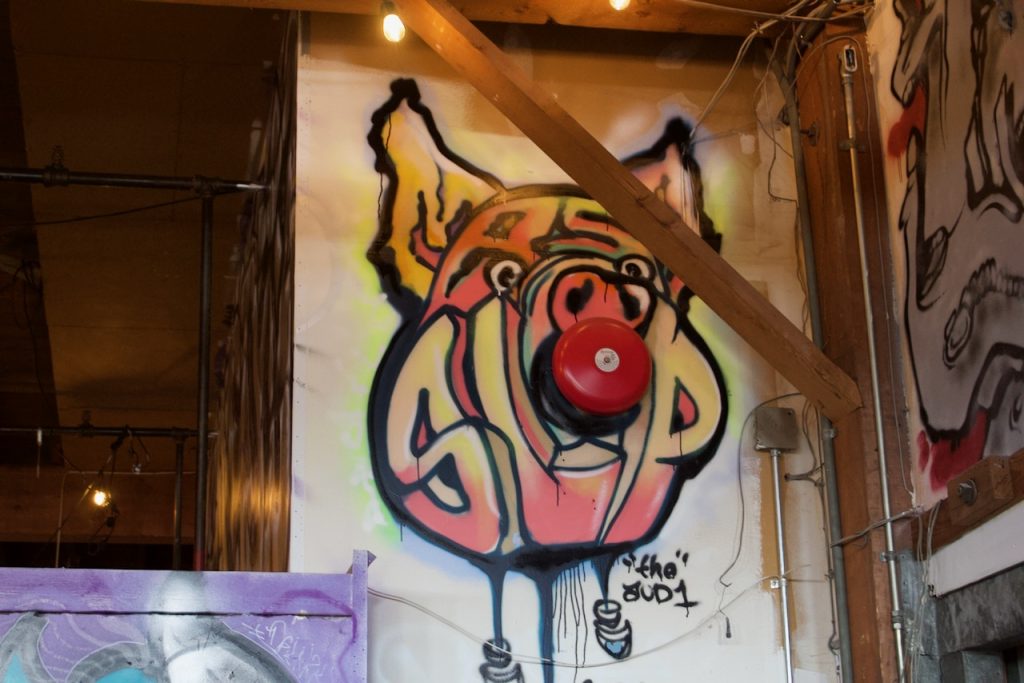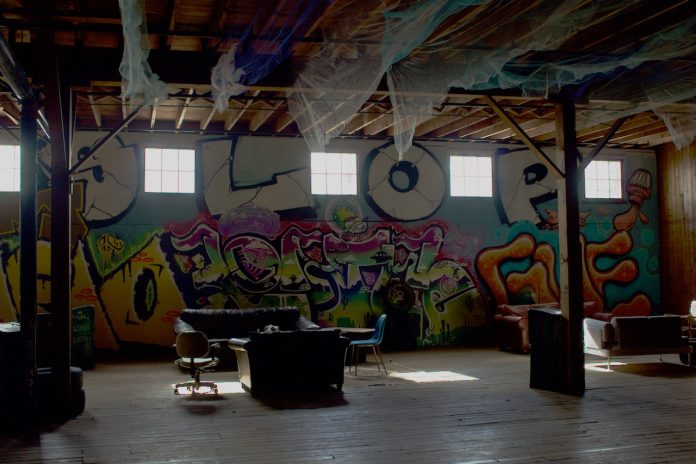
Some of the infrastructure in Ballard is so large that it’s virtually invisible. From rusting ship hulls in the canal to the marina complexes around the bridge, it is easy to overlook the evidence of industrial Seattle.
The block-long Magnum Storage building is among those too big to notice structures. It’s hard to wrap one’s mind around the fact that the hulking three-story wall on Shilshole Avenue is the same structure that sits behind a parking lot off Ballard Avenue between the Kavu outlet and the shuttered Great State Burger shop.
But attention is coming to the top corner of this building. Slop is opening and promises a new type of art space and venue that the city is missing. It’s not the industrial use that the neighborhood’s waterfront is accustomed. But Slop and the team of people running this space may be doing the hard work of energizing the city’s venues on a new, post-pandemic footing.
“Be goofy, and have fun. Get silly.”
Talking with the folks organizing Slop is an exercise in optimism, both in the potential for the space and the fascinating world of Seattle’s arts and music scenes. “Seattle underground needs an injection,” according to Syco, who led the graffiti murals that grace the walls of the space.
Scenes (plural) seems to be somewhat misleading, because Slop is a convergence of ideas. The space is much like the four founders themselves, who have overlapping but complementary experiences and skillsets. Sawyer Hindle is a producer doing the team’s design work, coming from club promotion and DJ’ing under the name Sawyer James. Lauren Taylor is the events and marketing manager, when not DJ’ing as Korra the Kid. The artist known as Syco leads the graffiti side as art and creative director.
“Not a director!” he says.
And Danny Strok is the venue manager, coming up through promotions roles at different venues after hopping from a career in sales. She found herself bored in the corporate world and sought out an internship for a venue that she found on Craigslist. “I met Syco through the music. Then Lauren and Sawyer. We met through music and Instagram. We worked on a rave together and we became friends.”
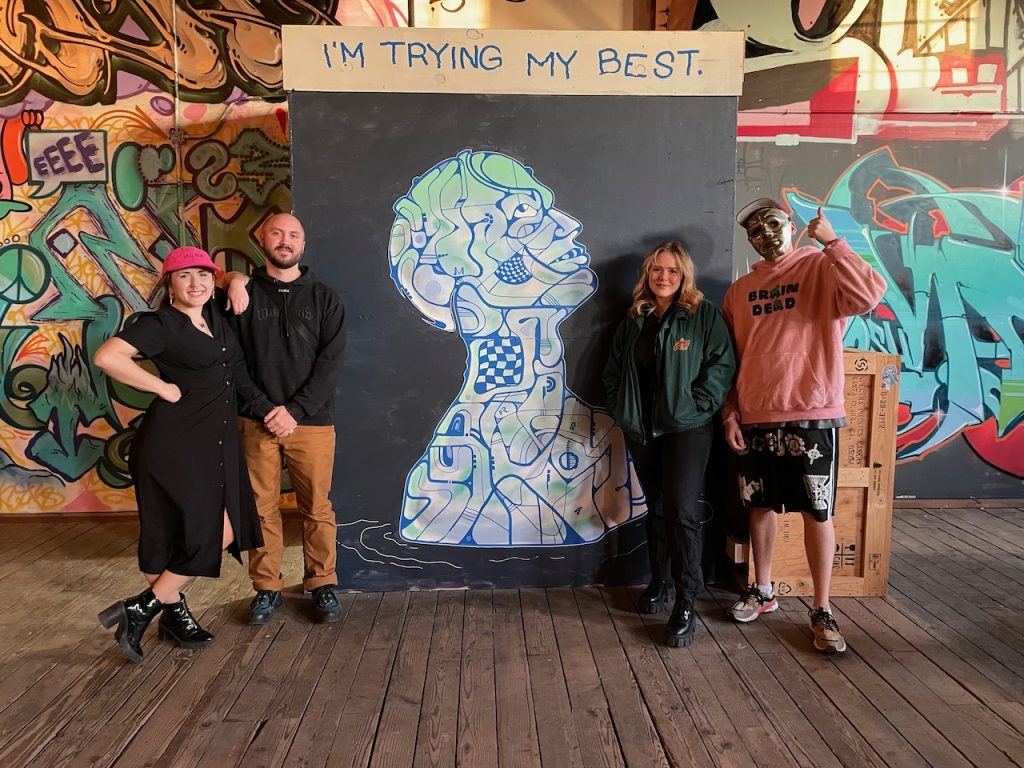
The team coalesced last year as they worked together on an earlier art space, the Ballard Pop-Up Art Gallery that took over the shuttered consignment shop just north of NW 24th Avenue and Market Street. When that event closed for the building to be redeveloped, the team organized themselves into Slop.
Henry Hog, The Slop’s logo and mascot, sums up the team’s creation through collaboration. Syco designed him, Hindle refined it to logo, and it’s Strok and Taylor getting the pink round face out to the world. Taylor also tells a bit of the legend. Slop is not an acronym or “We were thinking ‘Slophouse’ and that was the pig theme. But we don’t play house music. So just Slop.”
The multimedia perspective is a crucial component of Slop’s concept. Wrapping around the space is the art of dozens of graffiti artists befriended and recruited by Syco. Hindle and Taylor create music as DJs in overlapping genres. “Hip hop and techno and everything in between,” including a couple sub genres that I had to look up but we will just call “bass forward.”
It’s the convergence of art and music that separates Slop. According to the team, working in dedicated music venues can pigeonhole. As Taylor puts it, “The overall goal as a DJ is to have everyone dance and the music flow well. You want to cater your set to the other musicians you’re playing with… It’s one of the duties as a DJ to mold yourself into where you fit best into the set.”
Which makes the multimedia background of the team, and the flexibility of the venue, a massive strength. As Hindle says, “It’s a very large, genre spanning thing. That’s what’s nice about this space.”
Big Empty Room
Walking in from the street, technically the alley west of the northern end of Ballard Avenue, one might expect dark and metallic. Instead, the room opens to eclectic warm and daytime light from high windows. A tire swing hangs from an exposed wooden beam, timber of a size that don’t get grown any more. Gauze streamers and strings of oversized bulbs dangle and braid around utility conduit in the high open ceiling. Paintings find their spaces between open wall joists and a movie screen is ready between repatriated newspaper boxes.
The two concrete walls to the south and west are covered top to bottom in graffiti art. SYCO’s crew, called MRSA, interlaced their work together on the west wall in a roll of puffy text tags and block letters. It reads as a dialogue, spilling across the wall behind groups of stylish modern couches. The south wall is sectioned, each of the dozen spaces dedicated to the work of a separate artist. Bright, overlapping characters and riffs on animals pull from different parts of the world’s strangest storybook.
The space itself is 7,000 square feet of open floor plan that begs to be used and misused in the best ways. It lends itself to the flexibility that the team wants to see at Slop. The opening night party in late February was an invite-only music and art show driven by neon and curiosity.
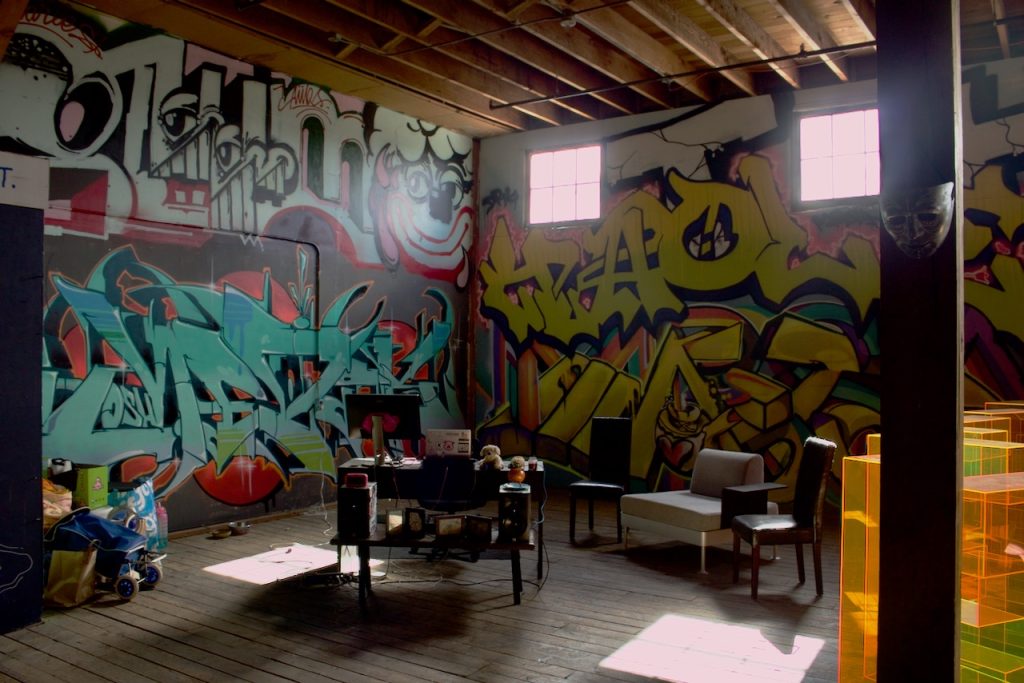
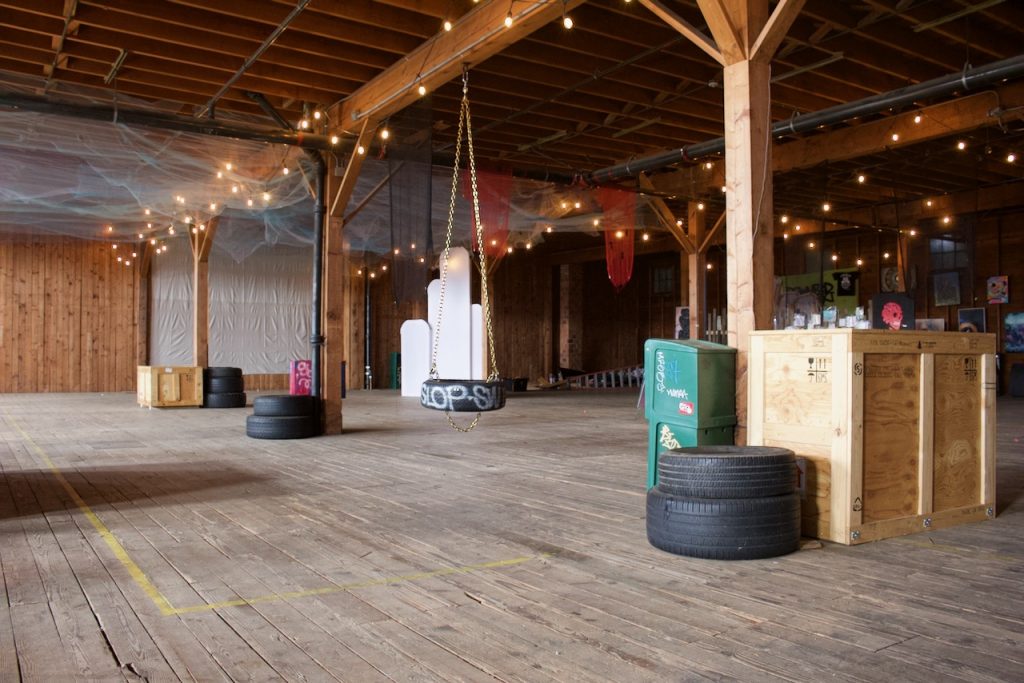
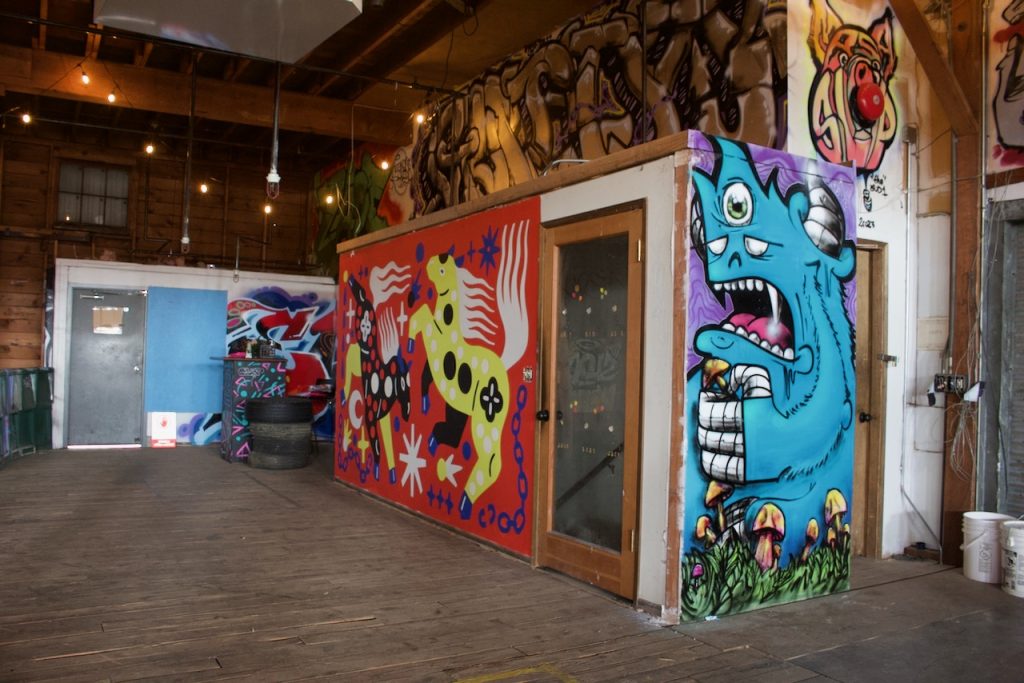
The space and its potential is alluring. “People come out of the woodwork when they see a picture of a big empty room. Like everyone was pulling us up on Instagram and was like ‘what is this room and why are you inside it?’” says Hindle. It brought out the generosity of the arts community, from the painters contributing to the walls to connections for the furniture and pieces of equipment. Moving away from the expected is the ultimate use for the space. “You can go to someone’s house or a bar or a music venue. Our goal is to be a rec space, or a community area.”
Perhaps not ultimate, actually. “We could host a wedding here,” quips Taylor. “That would be boss-level venue.”
The immediate Ballard community has been interested in the work happening off this alley just near the bell tower. “There are some of us that live in the community,” says Hindle. “We were nervous of the reception. You never know which side things are going to come down on. If it makes its way to Nextdoor, is it going to be a positive thing? Or will people perceive it negatively?”
But the reviews they’ve heard have been super positive with inquisitive kids and curious neighbors (like at least one reporter) sticking their heads in while passing by for Salt and Straw. First they’re happy to see this building being used. Second, they’re happy to see something new, with people that don’t come to Ballard a lot. Says Syco: “If you want a $60 candle, you’ll find it in Ballard. But you won’t find this.”
The next events planned for the space include a movie series and fundraising events. The team hopes to raise enough funds to get a collaborative mural on the outside of the building, facing the busy part of Ballard Avenue. And on April 9th, Slop will host a market put on by the Cosmic Thot Collective from 12pm to 5pm. The event will feature vendors, media, fashion and a “roller vibe” with music by DJ Having Sex.
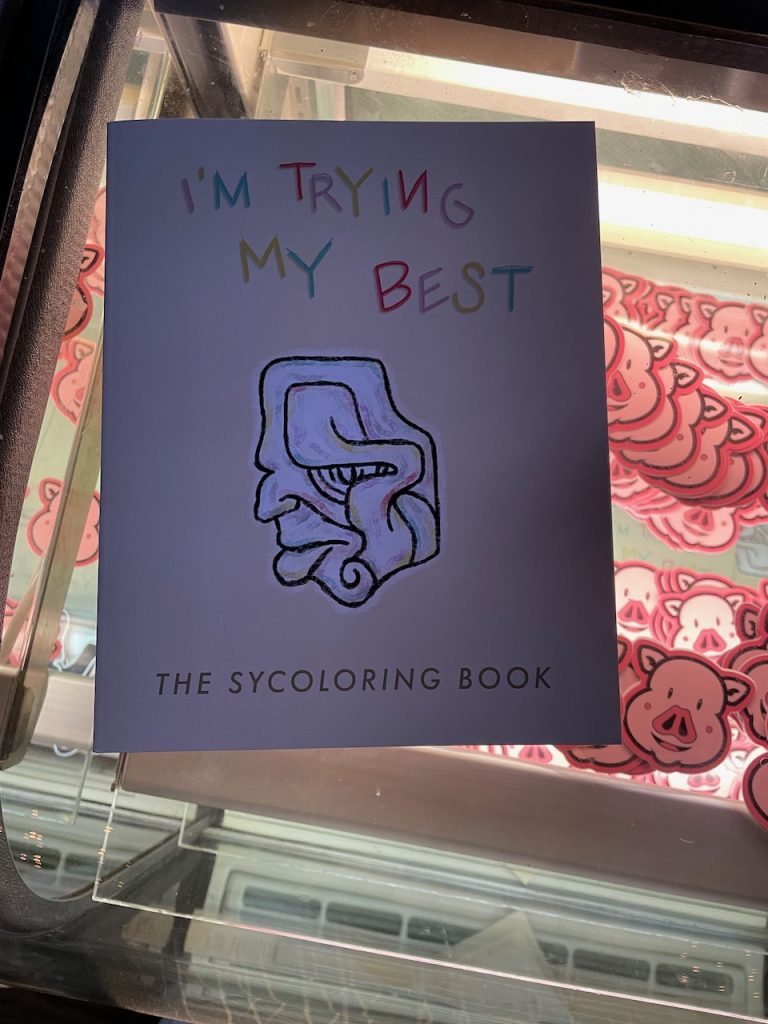
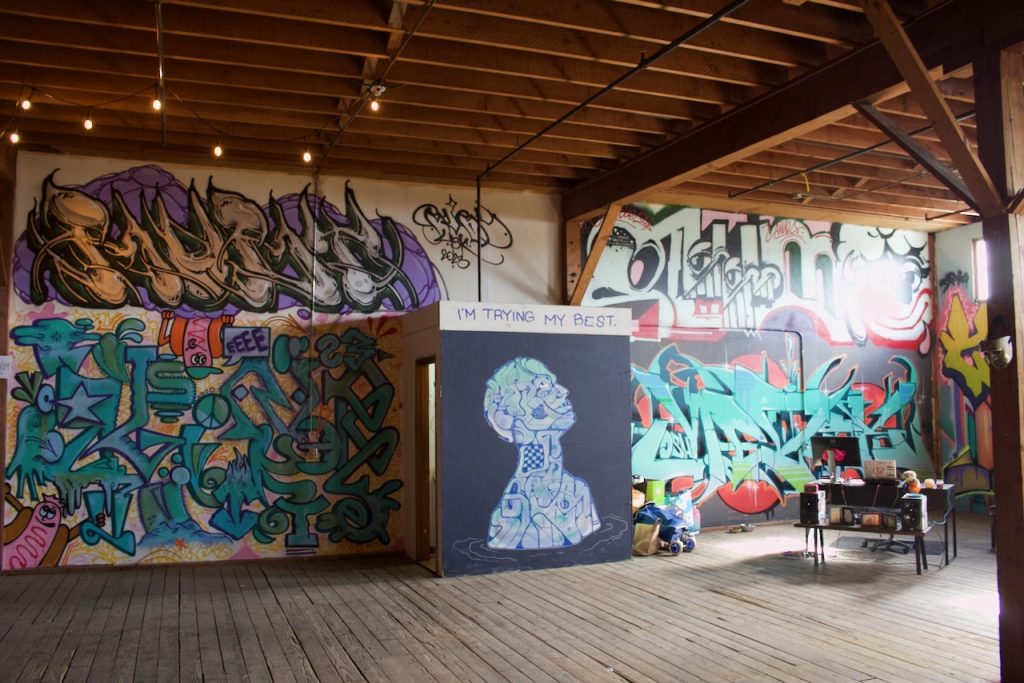
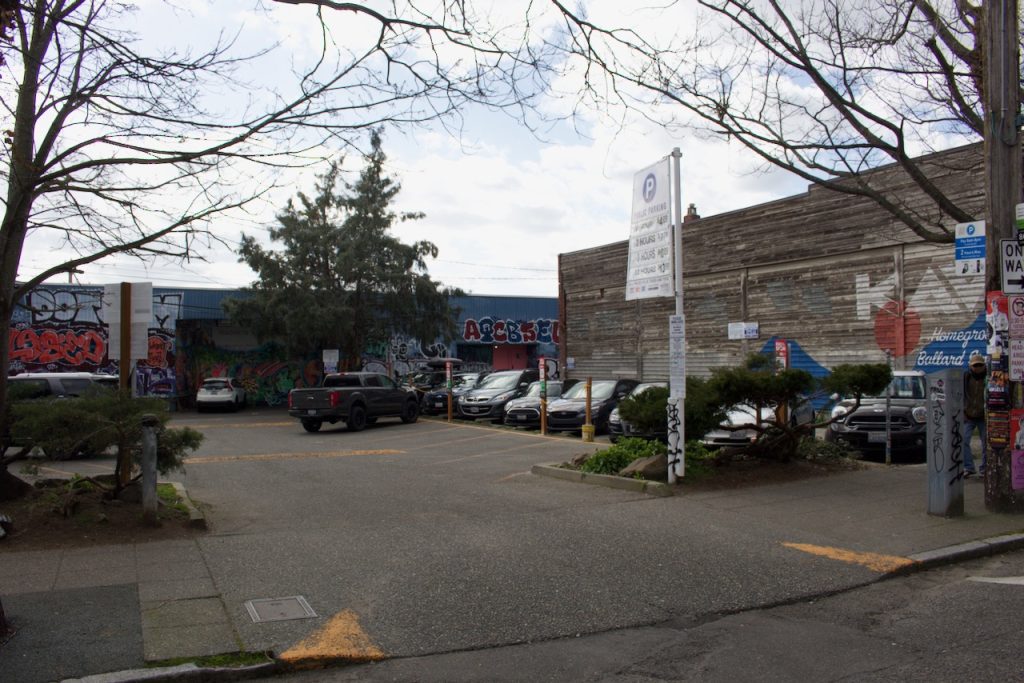
Physical Barriers and Liquor Barriers
The venue is of its time, having its own social media presence as well as the support of the expansive networks of its founders. “It’s the business of flirting,” says Strok of social media, specifically Instagram. “There’s times I don’t want to be on Instagram, but I know it’s how I reach so many people. It’s so easy to connect with creatives that way, just on the business level. You can interact with their posts and become friends. It’s crazy.”
Such networking is also the basis for the group and the space’s future. Slop is trying to fill a gap in Seattle arts and nightlife that became more pronounced during the pandemic. As Taylor puts it, Slop’s larger goal “is create events where people can come and express themselves in many different forms. Whether that’s a reptile art show or a movie night, whatever it may be, create somewhere where the cool hip people can come gather.”
Talking with the team behind Slop, there is a collective feeling that something in Seattle is about to click over, or kick up to another level. They point to XO Seattle and its artist and music takeover of a Pioneer Square building as highlighting something novel in town.
Taylor, in her work at other venues, found the need was pervasive. “Collectively, people are looking for something new or the young’uns aren’t connecting to the generations before them have set up as far as extra curriculars. And so it’s a bunch of people who want something to do and they want to unleash and let loose with nowhere to do so.”
Hindle agrees on the aspect of looking for something different. “A lot of established venues are built around being a bar. It’s a different energy, with a liquor barrier. It limits who you can ask.
“And things are so expensive now,” he adds. “Going out to dinner is a decision.”
Syco confirms it through a mouthful of sushi he brought in a takeout bag. “Right! Thirty bucks on this sushi and I was looking forward to it all day! It was a decision.”
It’s amazing to consider this monolithic industrial building as lowering the barrier to accessing art and culture in Seattle. Its vast space and the broader ambitions of its founding team, Slop’s new home in Ballard promises just that. Slop is a big empty room, full of promise.
Ray Dubicki is a stay-at-home dad and parent-on-call for taking care of general school and neighborhood tasks around Ballard. This lets him see how urbanism works (or doesn’t) during the hours most people are locked in their office. He is an attorney and urbanist by training, with soup-to-nuts planning experience from code enforcement to university development to writing zoning ordinances. He enjoys using PowerPoint, but only because it’s no longer a weekly obligation.


